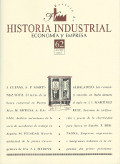Los «consorzi vinicoli» en Italia durante el siglo xx: un modelo de empresa cooperativa de éxito
Palabras clave:
Sector vitivinícola, bodegas cooperativas, Italia, siglo xxResumen
Las bodegas cooperativas de los tradicionales países productores de vino de la Europa mediterránea presentan una serie de características históricas similares, y desempeñan un papel destacado a la hora de entender la evolución histórica del sector vitivinícola europeo. En este marco destaca el caso de Italia, donde las bodegas cooperativas han experimentado un mayor éxito empresarial, contradiciendo así a aquella parte de la teoría económica que considera que este modelo de empresa es menos eficiente que la capitalista y que es útil únicamente en momentos de crisis. El objetivo principal de este trabajo es establecer cuáles fueron las causas de que estas entidades se hayan convertido en un caso de éxito empresarial, al contrario que en otros países del sur de Europa. Consideramos que la clave de este hecho diferencial fue la presencia de «organizaciones paraguas» que durante la segunda mitad del siglo xx ayudaron a estructurar y desarrollar el sector con el fin de aumentar su capacidad competitiva mediante la creación de grandes consorcios cooperativos de segundo y tercer grado (consorzi vinicoli).Descargas
Descargas
Publicado
Cómo citar
Número
Sección
Licencia
El/la autor/a cede los derechos al/la editor/a. Creative Commons
El/la autor/a que publica en esta revista está de acuerdo con los términos siguientes:
- El/la autor/a cede en exclusiva todos los derechos de propiedad intelectual al/la editor/a para todo el mundo y toda la duración de los derechos de propiedad intelectual vigentes aplicables.
- El/la editor/a difundirá los textos con la licencia de reconocimiento de Creative Commons que permite compartir la obra con terceros, siempre que éstos reconozcan su autoría, su publicación inicial en esta revista y las condiciones de la licencia.





